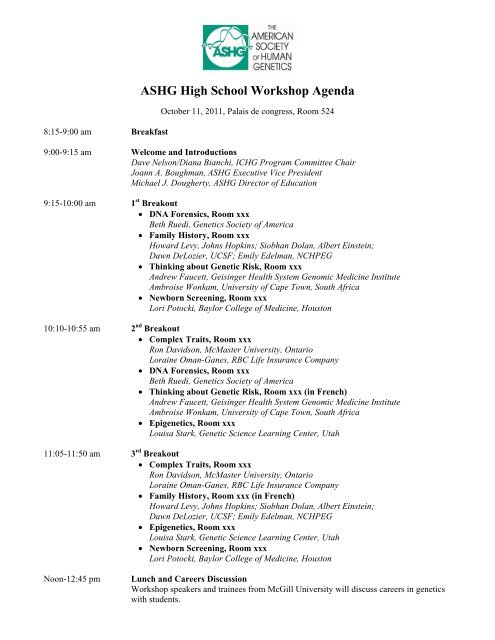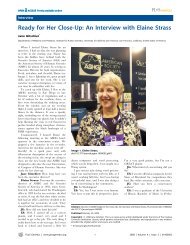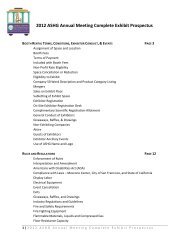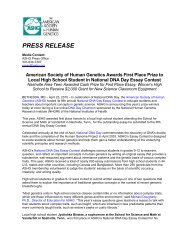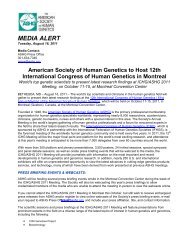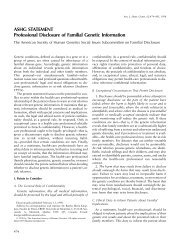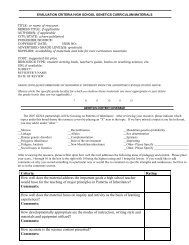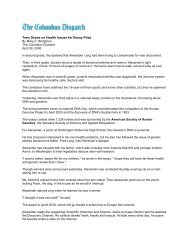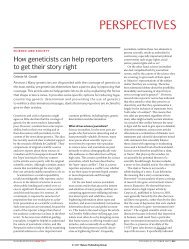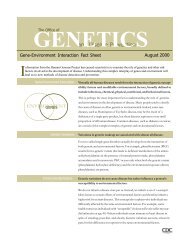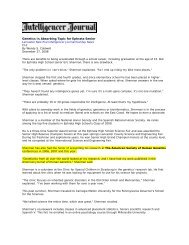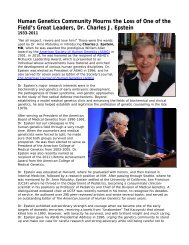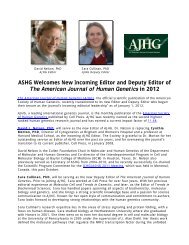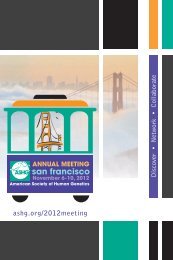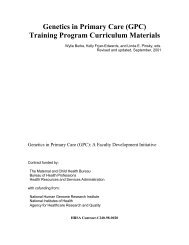ASHG High School Workshop Agenda - American Society of Human ...
ASHG High School Workshop Agenda - American Society of Human ...
ASHG High School Workshop Agenda - American Society of Human ...
You also want an ePaper? Increase the reach of your titles
YUMPU automatically turns print PDFs into web optimized ePapers that Google loves.
8:15-9:00 am Breakfast<br />
<strong>ASHG</strong> <strong>High</strong> <strong>School</strong> <strong>Workshop</strong> <strong>Agenda</strong><br />
October 11, 2011, Palais de congress, Room 524<br />
9:00-9:15 am Welcome and Introductions<br />
Dave Nelson/Diana Bianchi, ICHG Program Committee Chair<br />
Joann A. Boughman, <strong>ASHG</strong> Executive Vice President<br />
Michael J. Dougherty, <strong>ASHG</strong> Director <strong>of</strong> Education<br />
9:15-10:00 am 1 st Breakout<br />
• DNA Forensics, Room xxx<br />
Beth Ruedi, Genetics <strong>Society</strong> <strong>of</strong> America<br />
• Family History, Room xxx<br />
Howard Levy, Johns Hopkins; Siobhan Dolan, Albert Einstein;<br />
Dawn DeLozier, UCSF; Emily Edelman, NCHPEG<br />
• Thinking about Genetic Risk, Room xxx<br />
Andrew Faucett, Geisinger Health System Genomic Medicine Institute<br />
Ambroise Wonkam, University <strong>of</strong> Cape Town, South Africa<br />
• Newborn Screening, Room xxx<br />
Lori Potocki, Baylor College <strong>of</strong> Medicine, Houston<br />
10:10-10:55 am 2 nd Breakout<br />
• Complex Traits, Room xxx<br />
Ron Davidson, McMaster University, Ontario<br />
Loraine Oman-Ganes, RBC Life Insurance Company<br />
• DNA Forensics, Room xxx<br />
Beth Ruedi, Genetics <strong>Society</strong> <strong>of</strong> America<br />
• Thinking about Genetic Risk, Room xxx (in French)<br />
Andrew Faucett, Geisinger Health System Genomic Medicine Institute<br />
Ambroise Wonkam, University <strong>of</strong> Cape Town, South Africa<br />
• Epigenetics, Room xxx<br />
Louisa Stark, Genetic Science Learning Center, Utah<br />
11:05-11:50 am 3 rd Breakout<br />
• Complex Traits, Room xxx<br />
Ron Davidson, McMaster University, Ontario<br />
Loraine Oman-Ganes, RBC Life Insurance Company<br />
• Family History, Room xxx (in French)<br />
Howard Levy, Johns Hopkins; Siobhan Dolan, Albert Einstein;<br />
Dawn DeLozier, UCSF; Emily Edelman, NCHPEG<br />
• Epigenetics, Room xxx<br />
Louisa Stark, Genetic Science Learning Center, Utah<br />
• Newborn Screening, Room xxx<br />
Lori Potocki, Baylor College <strong>of</strong> Medicine, Houston<br />
Noon-12:45 pm<br />
Lunch and Careers Discussion<br />
<strong>Workshop</strong> speakers and trainees from McGill University will discuss careers in genetics<br />
with students.
12:55-1:40 pm 4 th Breakout<br />
• Complex Traits, Room xxx<br />
Ron Davidson, McMaster University, Ontario<br />
Loraine Oman-Ganes, RBC Life Insurance Company<br />
• Family History, Room xxx<br />
Howard Levy, Johns Hopkins; Siobhan Dolan, Albert Einstein;<br />
Dawn DeLozier, UCSF; Emily Edelman, NCHPEG<br />
• Epigenetics, Room xxx<br />
Louisa Stark, Genetic Science Learning Center, Utah<br />
• Thinking about Genetic Risk, Room xxx<br />
Andrew Faucett, Geisinger Health System Genomic Medicine Institute<br />
Ambroise Wonkam, University <strong>of</strong> Cape Town, South Africa<br />
1:50-2:30 pm Plenary Session<br />
The Spirit <strong>of</strong> Difference<br />
Rick Guidotti, Positive Exposure<br />
Breakout Session Descriptions<br />
Basic- These sessions will be appropriate for students at any level <strong>of</strong> genetics knowledge.<br />
Thinking about Genetic Risk<br />
Each <strong>of</strong> us possesses a unique genome, and the cost <strong>of</strong> sequencing those genomes continues to decline. As<br />
sequencing becomes ever more affordable, what challenges and opportunities will our DNA sequence present<br />
What risks might be revealed In this session, students will explore some <strong>of</strong> the information available through<br />
genetic testing, including information provided to consumers through commercial sequencing services.<br />
Family History<br />
Did grandfather Joe have Alzheimer’s disease If so, does that mean that I’m at risk <strong>of</strong> getting the disease too In<br />
this session, students will explore the power <strong>of</strong> family history information. They will construct pedigrees, follow<br />
the inheritance <strong>of</strong> several different types <strong>of</strong> traits, and try to make predictions based on their evidence.<br />
DNA Forensics<br />
Most people are more genetically alike than different, with estimates that up to 99.9% <strong>of</strong> human DNA sequences<br />
are exactly the same for all people on Earth. But we also know that each one <strong>of</strong> us has a unique genome. Find out<br />
how forensic detectives tease out that 1/10 th <strong>of</strong> 1% difference to identify individuals. Students will discover the<br />
power and pitfalls <strong>of</strong> DNA identification analysis as they work as analysts, medical examiners, and law <strong>of</strong>ficers,<br />
using information from DNA pr<strong>of</strong>iles to piece together crucial evidence that may – or may not – “make their<br />
case”.<br />
Complex Traits<br />
Widow’s peaks, tongue rolling, and earlobe attachment are familiar examples <strong>of</strong> genetic traits, but even these<br />
“simple” Mendelian traits may have more complex inheritance than first realized. If that’s the case, where does<br />
that leave our understanding <strong>of</strong> quantitative traits, such as height, intelligence, and cholesterol level In this<br />
session, students will explore complex human traits and how modern genomics is helping us understand their<br />
genetic and environmental causes.<br />
Advanced- These sessions will assume more prior genetics knowledge by students.<br />
Newborn Screening
Have you ever wondered how much physicians and geneticists can learn about us from the moment we are born<br />
Newborns are routinely screened for a variety <strong>of</strong> dangerous and <strong>of</strong>ten preventable disorders that may be present at<br />
birth. Students will explore some <strong>of</strong> those traits, including the foods eaten by persons with certain metabolic<br />
disorders, and learn about the underlying genetics.<br />
Epigenetics: The Interaction <strong>of</strong> Genes and Environment<br />
Can the amount <strong>of</strong> licking that a rat mother provides her pups really affect their response to stress as adults<br />
Surprisingly, yes, and the explanation isn’t in their genes (at least not how you might think!). Rat nurturing<br />
behavior isn’t the only example <strong>of</strong> this fascinating phenomenon. In this session, students will learn how<br />
environmental factors can affect gene expression, traits, and inheritance.


